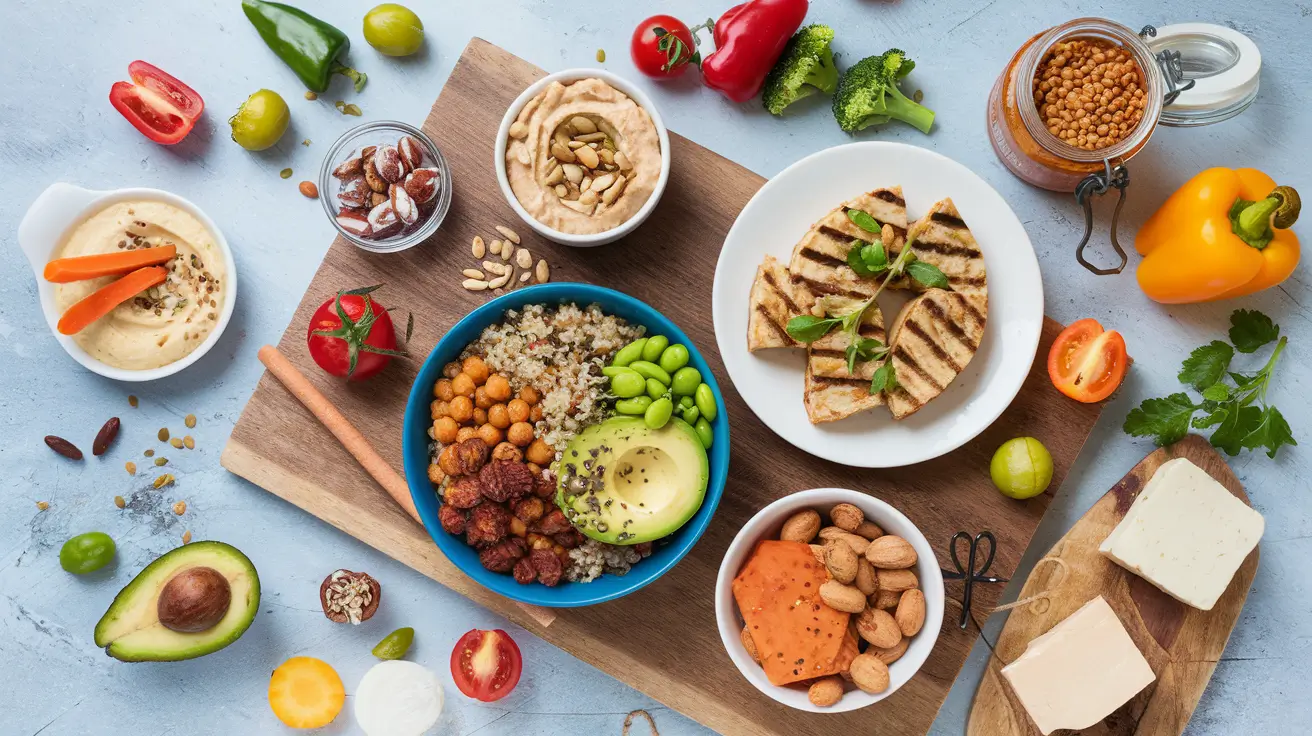22 Protein-Rich Vegetarian Recipes to Power Your Day

In the world of plant-based eating, getting enough protein is a common concern. However, with the right recipes and ingredients, it’s entirely possible to meet your protein needs while enjoying delicious vegetarian meals. This comprehensive guide offers 22 protein-packed vegetarian recipes that are not only nutritious but also satisfying and full of flavor.
Table of Contents
- Understanding Protein in Vegetarian Diets
- High-Protein Vegetarian Breakfast Recipes
- Protein-Packed Vegetarian Lunch Ideas
- Hearty Vegetarian Dinner Recipes
- Protein-Rich Vegetarian Snacks and Sides
- Tips for Boosting Protein in Vegetarian Meals
- FAQs About Protein-Rich Vegetarian Eating
Understanding Protein in Vegetarian Diets
Before diving into the recipes, it’s important to understand that vegetarian diets can provide all the necessary proteins when properly planned. Key plant-based protein sources include:
- Legumes (beans, lentils, peas)
- Nuts and seeds
- Whole grains
- Soy products (tofu, tempeh, edamame)
- Dairy and eggs (for lacto-ovo vegetarians)
Now, let’s explore some delicious ways to incorporate these protein sources into your meals.
High-Protein Vegetarian Breakfast Recipes
- Tofu Scramble with Vegetables
- Protein: 20g per serving
- Key ingredients: Firm tofu, bell peppers, spinach, nutritional yeast
- Greek Yogurt Parfait with Nuts and Berries
- Protein: 18g per serving
- Key ingredients: Greek yogurt, mixed nuts, chia seeds, mixed berries
- Peanut Butter and Banana Smoothie Bowl
- Protein: 15g per serving
- Key ingredients: Peanut butter, banana, spinach, plant-based protein powder
- Chickpea Flour Pancakes
- Protein: 12g per serving
- Key ingredients: Chickpea flour, eggs, milk (dairy or plant-based)
- Quinoa Breakfast Bowl with Eggs and Avocado
- Protein: 22g per serving
- Key ingredients: Quinoa, eggs, avocado, cherry tomatoes
Protein-Packed Vegetarian Lunch Ideas
- Lentil and Vegetable Soup
- Protein: 15g per serving
- Key ingredients: Red lentils, mixed vegetables, vegetable broth
- Chickpea Salad Sandwich
- Protein: 14g per serving
- Key ingredients: Chickpeas, vegan mayo, celery, whole grain bread
- Spinach and Feta Quiche
- Protein: 18g per serving
- Key ingredients: Eggs, feta cheese, spinach, whole wheat pastry
- Black Bean and Quinoa Bowl
- Protein: 20g per serving
- Key ingredients: Black beans, quinoa, corn, avocado
- Tempeh Veggie Wrap
- Protein: 16g per serving
- Key ingredients: Tempeh, hummus, mixed vegetables, whole wheat wrap
Hearty Vegetarian Dinner Recipes
- Lentil and Mushroom Shepherd’s Pie
- Protein: 18g per serving
- Key ingredients: Green lentils, mushrooms, mashed potatoes
- Stuffed Bell Peppers with Quinoa and Black Beans
- Protein: 15g per serving
- Key ingredients: Bell peppers, quinoa, black beans, cheese
- Tofu and Vegetable Stir-Fry
- Protein: 20g per serving
- Key ingredients: Extra-firm tofu, mixed vegetables, brown rice
- Vegetarian Chili with Mixed Beans
- Protein: 22g per serving
- Key ingredients: Kidney beans, black beans, chickpeas, textured vegetable protein
- Eggplant Parmesan
- Protein: 16g per serving
- Key ingredients: Eggplant, mozzarella cheese, parmesan cheese, marinara sauce
- Spinach and Ricotta Stuffed Shells
- Protein: 19g per serving
- Key ingredients: Jumbo pasta shells, ricotta cheese, spinach, marinara sauce
Protein-Rich Vegetarian Snacks and Sides
- Roasted Chickpeas
- Protein: 7g per serving
- Key ingredients: Chickpeas, olive oil, spices
- Greek Yogurt Dip with Vegetable Sticks
- Protein: 10g per serving
- Key ingredients: Greek yogurt, herbs, mixed raw vegetables
- Edamame Hummus with Whole Grain Crackers
- Protein: 9g per serving
- Key ingredients: Edamame, tahini, whole grain crackers
- Trail Mix with Nuts and Seeds
- Protein: 8g per serving
- Key ingredients: Almonds, pumpkin seeds, sunflower seeds, dried fruit
- Cottage Cheese with Fruit and Nuts
- Protein: 15g per serving
- Key ingredients: Cottage cheese, mixed berries, chopped nuts
- Peanut Butter Energy Balls
- Protein: 6g per serving
- Key ingredients: Peanut butter, oats, chia seeds, honey
Tips for Boosting Protein in Vegetarian Meals
- Incorporate a variety of protein sources: Combine different plant proteins to ensure you’re getting all essential amino acids.
- Use protein-rich garnishes: Top salads and soups with seeds, nuts, or crumbled cheese for an extra protein boost.
- Experiment with meat alternatives: Try different varieties of tofu, tempeh, and seitan in your recipes.
- Don’t forget about whole grains: Quinoa, amaranth, and teff are particularly high in protein.
- Add legumes to unexpected places: Blend white beans into smoothies or add lentils to your pasta sauce.
- Consider protein powders: Plant-based protein powders can be added to smoothies, baked goods, and even savory dishes.
FAQs About Protein-Rich Vegetarian Eating
- Q: How much protein do I need as a vegetarian?
A: The recommended daily allowance for protein is 0.8 grams per kilogram of body weight. However, athletes or those trying to build muscle may need more. - Q: Can I get complete proteins from plant sources?
A: Yes, by eating a variety of plant proteins throughout the day, you can get all essential amino acids. Some plant foods like quinoa and soy are complete proteins on their own. - Q: Are protein-rich vegetarian meals suitable for weight loss?
A: Yes, high-protein vegetarian meals can be excellent for weight loss as they help you feel full and satisfied while typically being lower in calories than meat-based meals. - Q: How can I ensure I’m getting enough iron as a vegetarian?
A: Consume iron-rich plant foods like lentils, spinach, and fortified cereals. Pair these with vitamin C-rich foods to enhance iron absorption. - Q: Is it necessary to combine different plant proteins at every meal?
A: While it’s not necessary at every meal, aim to eat a variety of protein sources throughout the day to ensure you’re getting all essential amino acids.
By incorporating these protein-rich vegetarian recipes into your meal rotation, you can easily meet your protein needs while enjoying a diverse and delicious plant-based diet. Remember, the key to a successful vegetarian diet is variety – experiment with different ingredients and recipes to find what works best for you. With these nutrient-dense, flavorful options, you’ll never feel like you’re missing out on protein or taste!




